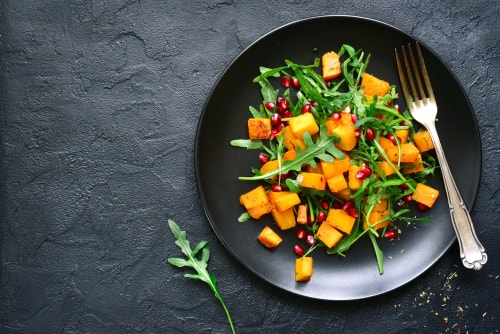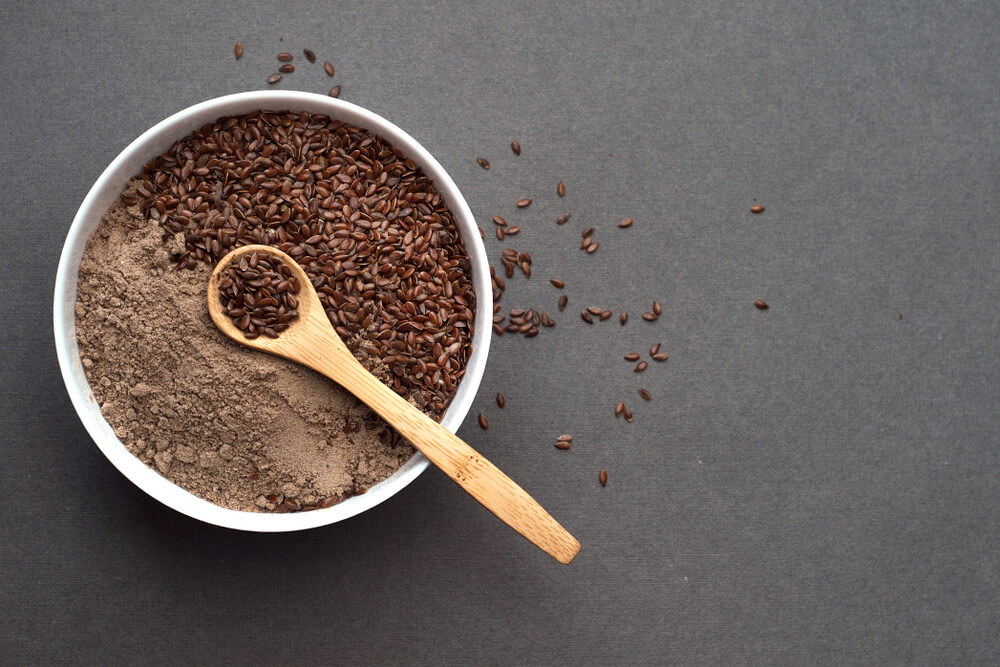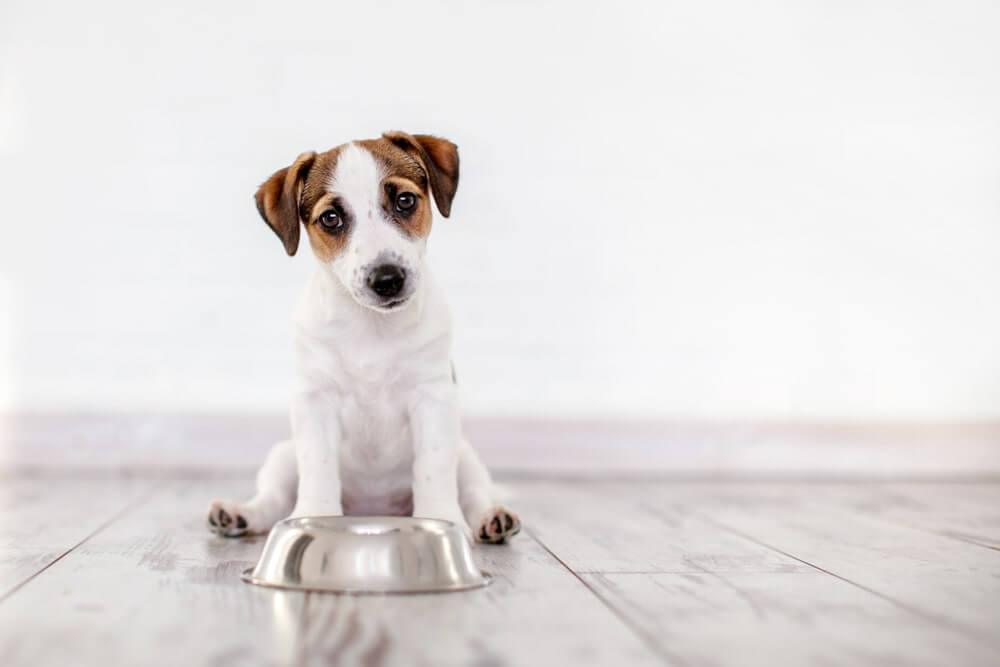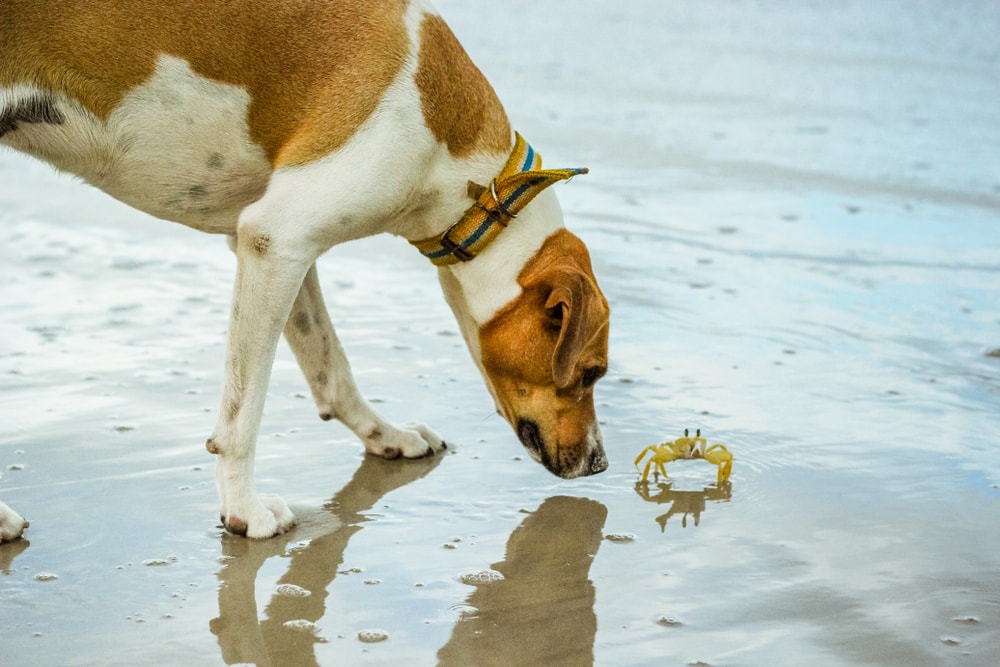Hey Ollie blog readers! We’re offering you an exclusive 60% OFF your starter box! Try now!
If you’re chopping up some butternut squash, zucchini, or pumpkin for dinner, you might wonder, “can dogs eat squash?”. The good news: yes! Most squash types are safe for dogs and can add healthy fiber, vitamins, and minerals to their bowl.
But like any veggie, there are a few things to watch for. Some squash needs to be cooked first, seeds and skins should be removed, and too much can upset your dog’s stomach.
In this guide, we’ll break down the benefits of squash for dogs, which varieties are safest, including butternut squash, and how to serve squash the right way to keep your pup healthy and happy.
Can Dogs Eat Squash?
Yes, dogs can eat squash—and most of them actually enjoy it. Whether it’s butternut, acorn, spaghetti, or even zucchini (which is technically a type of summer squash), squash is generally safe for dogs to eat when it’s cooked and served plain.
Squash is naturally low in fat and calories but packed with fiber, vitamins, and minerals. It’s gentle on the digestive system and can be a great addition to your dog’s regular diet—as long as it’s prepared the right way.
Here are a few quick tips for feeding squash to your dog safely:
- Always cook it first – Steamed, baked, or boiled squash is easier for dogs to digest than raw.
- Skip the seasonings – Avoid adding butter, salt, garlic, onions, or any seasoning blends.
- Remove the seeds and skin – These parts can be tough to chew and digest, especially for smaller dogs.
- Serve in small portions – Too much at once can lead to gas or loose stools, especially if your dog isn’t used to it.
Whether mixed into their meals or served as a treat, squash can be a healthy, dog-friendly veggie when offered in moderation.
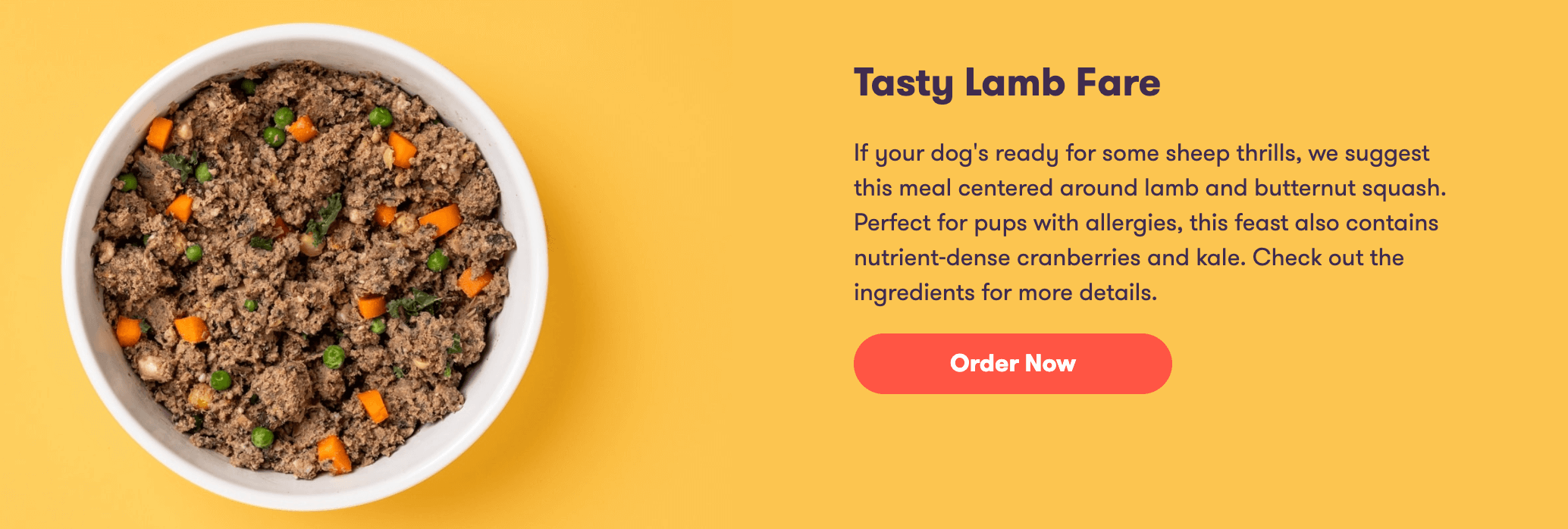
Is Squash Good For Dogs? Is It Safe?
Squash doesn’t just pass the safety test—it also brings real nutritional value to the table. When served properly, squash can offer a range of benefits for dogs of all ages.
Here’s why squash is a smart, safe veggie option for your pup:
- High in fiber – Helps support digestive health and regular bowel movements.
- Rich in vitamins A, C, and B6 – Supports vision, immune function, and energy metabolism.
- Packed with antioxidants – Helps combat inflammation and protect cells from damage.
- Low in calories – Great for dogs who need to maintain or lose weight.
- Hydrating – Squash contains a high water content, which can help with hydration, especially in warmer months.
The key to keeping squash safe is portion control and proper preparation. It should always be cooked, unseasoned, and served in bite-sized pieces. And like any new food, introduce it slowly—especially if your dog has a sensitive stomach.
For most dogs, squash is more than just safe—it’s a wholesome, nutrient-rich add-on that fits beautifully into a fresh, balanced diet.
Potential Health Benefits of Squash for Dogs
Feeding your dog squash along with a nutrient complete dog food can help to provide additional benefits as well as a tasty snack to your dog’s life. Below are some of the health and nutritional benefits of squash for dogs:
1. Squash is High in fiber
Like many other fruits and vegetables, squash contains fiber that helps your dog feel full and help keeps their digestive system running smoothly. If you have a dog who is always hungry, adding fiber to their diet from healthy sources like squash can help them feel full for longer.
2. Low in calories
Squashes are lower in calories and therefore suitable for dogs who are looking to lose a few pounds. They have a high water content and plenty of fiber to help your pup feel full without adding too many calories. If you have a dog that is underweight, they can also enjoy squash but chat with your vet about pairing it with good sources of protein and fat to help them gain weight the healthy way.
3. Packed with vitamins and nutrients
In the Natural Pet Food Cookbook, Wendy Nan Rees and Kevin Schlanger, DVM, say that squash “has lots of beta carotene and vitamin A…Plus, it’s naturally sweet which dogs love. Many kinds of squash are also rich in potassium, which helps to maintain electrolyte balance.” Ollie includes freshly cooked squash in a number of its recipes so that dogs can reap these excellent health benefits.
Potential Risks of feeding squash to your dog
When it comes to squash for dogs, the only real danger is difficulty digesting. Remove the rough bits (seeds and skin) and cook the squash before feeding it to your dog. Raw squash is especially tough may be tough on your dog’s stomach, causing diarrhea or vomiting. It’s best to steam or bake squash before giving it to your pup.
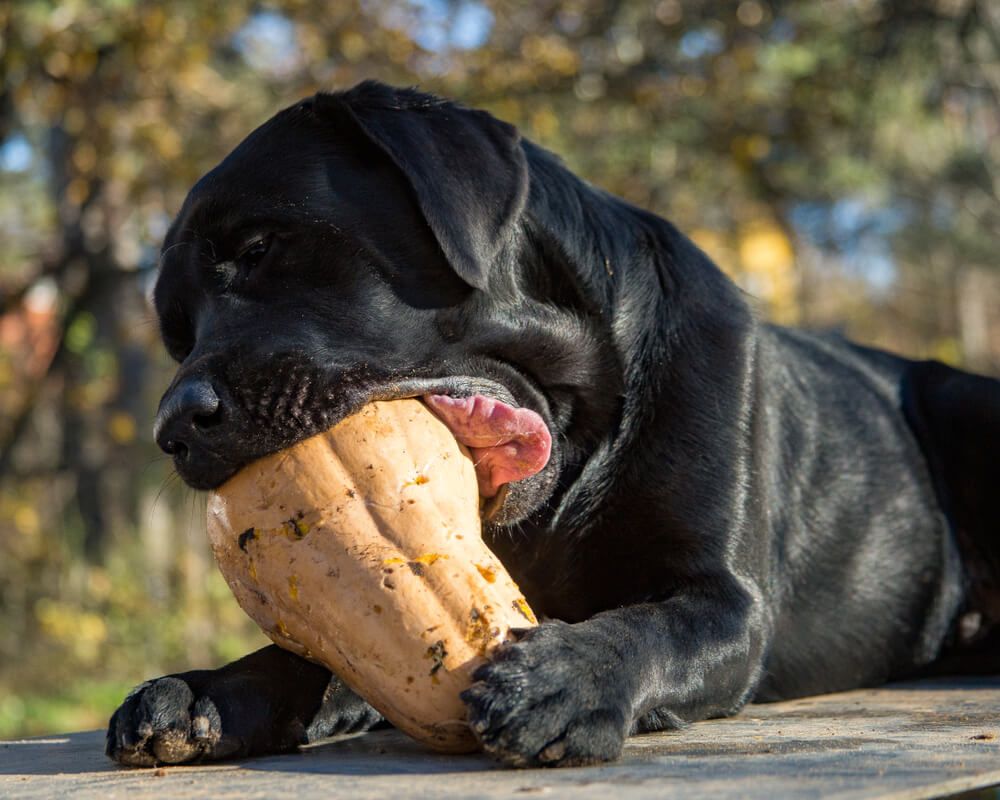
Leave out unnecessary butter or oil and skip garlic or onions, which can be toxic for dogs. If your dog has a sweet tooth, its okay to add some cinnamon to your squash (especially pumpkin or butternut squash) but you should also skip any added sugar.
What Types of Squash Can Dogs Eat Safely?
Not all squashes are created equal—but most of the common varieties found in kitchens are safe for dogs when cooked and served properly.
Here are some dog-friendly types of squash you can feel good about offering:
1. Butternut squash
This slightly awkwardly shaped squash has a boatload of health benefits for dogs. It’s especially rich in potassium (one cup contains more than a whole banana!), which is critical when it comes to the functioning of kidneys, muscles, nerves, and enzymes.
2. Pumpkin
Pureed pumpkin is a popular anecdote for dogs experiencing constipation. The soluble fiber helps to get things moving without adverse effects. Pumpkin is also rich in carotenoids for better skin and eye health and the anti-inflammatory vitamin E. Try making these healthy pumpkin dog treats that your pup will love.
3. Zucchini
Easier to digest than most squashes, zucchini is usually well-tolerated by dogs and can be eaten raw with the seeds. The long green squash is rich in potassium, beta-carotene, and folate, which is important for cell health and maintaining a quickly ticking metabolism.
4. Acorn Squash
This cute little squash is rich in vitamin V, folate, and vitamin B-6. Vitamin B-6 helps promote healthy digestion and a shiny coat. Acorn squash is especially high in vitamin C as well, which is best enjoyed by dogs in moderation and excessive amounts can lead to calcium oxalate stones.
4. Yellow Squash (Straightneck or Crookneck)
Another mild, easy-to-digest option. Just make sure it’s fully cooked and free of seeds or added fats.
Types of Squash To Avoid:
While most culinary squashes are safe, ornamental gourds and wild squashes should be avoided. These are not intended for eating and may cause digestive issues or toxicity.
As always, stick to plain, cooked squash—no butter, oils, garlic, onions, or seasoning blends. If you’re unsure about a specific type of squash or how your dog might react, start with a small amount and watch for any changes in digestion or behavior.
Remember, any time you introduce a new food to your dog, it’s best to do so slowly! Try mixing a spoonful of cooked squash into your dog’s food and see how he fares. If your dog loves squash and it agrees with his digestive system, this is a great vegetable to include in a healthy diet.
Squash Nutrition Facts
Squash is more than just a filler—it’s a nutrient-dense vegetable that can offer real health benefits when added to your dog’s bowl. While there are several types of squash, most share a similar nutritional profile that supports everything from digestion to immune function.
Here’s a look at what you’ll typically find in ½ cup of cooked, plain butternut squash (one of the most popular varieties):
- Calories: ~40
- Dietary Fiber: ~3 grams
- Vitamin A: Over 200% of a dog’s daily requirement
- Vitamin C: ~15% of the daily value
- Vitamin B6: Supports brain health and energy metabolism
- Potassium: Helps regulate muscle and nerve function
- Magnesium & Manganese: Supports healthy bones and enzyme function
Squash is naturally low in fat and free of cholesterol. It also contains antioxidants like beta-carotene and lutein, which may help reduce inflammation and support eye health over time.
This nutritional mix makes squash a smart, low-calorie way to supplement your dog’s diet—especially if they’re on a fresh food plan or need extra fiber to support healthy digestion.
How To Safely Feed Squash To Your Dog
Squash can be a healthy treat for dogs, but only if it’s prepared the right way. Here’s how to make sure squash stays safe and easy on your dog’s tummy.
- Pick the right squash:
Stick to dog-friendly types like butternut squash, pumpkin, acorn squash, or zucchini. Avoid giving your dog any squash that’s moldy or overly hard to chew.
- Remove the skin and seeds:
Most squash skins and seeds are tough for dogs to digest. Peel the squash and scoop out the seeds before cooking. This helps prevent choking or tummy trouble.
- Cook it plain:
Steam, boil, or bake the squash until it’s soft. Never add butter, oil, salt, garlic, or seasonings — plain is best. Cooked squash is gentler on your dog’s stomach than raw squash.
- Let it cool:
Hot squash can burn your dog’s mouth. Let it cool completely before serving.
- Serve small portions:
Start with a spoonful or two mixed into your dog’s regular food. Too much squash at once can cause gas or diarrhea. If your dog is new to squash, go slow and watch for any signs of an upset stomach.
- Talk to your vet:
If your dog has food allergies or a sensitive stomach, check with your vet before adding new veggies. They can recommend safe serving sizes and help you pick the best type of squash for your pup’s needs.ExpertTip: If you want to make squash extra tasty, mash it up and mix it with your dog’s usual meal. Many pups love the sweet, soft texture!
Frequently Asked Questions Squash For Dogs
Can dogs eat raw squash?
Most dogs can handle small bites of raw squash, like zucchini, but cooked squash is much easier to digest. Raw winter squash (like butternut or pumpkin) can be tough and may cause tummy trouble, so it’s better cooked and soft.
Can dogs eat squash seeds?
It’s best to remove seeds before feeding squash to your dog. While a few seeds won’t usually hurt, they can be hard to digest and may cause choking in smaller pups.
Can dogs eat butternut squash?
Yes! Butternut squash is safe for dogs when cooked and plain, no butter, salt, or seasonings. It’s packed with fiber, vitamins A and C, and can help support healthy digestion.
Is squash good for dogs with sensitive stomachs?
Squash can be gentle on the tummy when cooked and served in small amounts. The fiber helps some dogs with mild constipation, but too much can cause diarrhea or gas. Always start slow if your dog has a sensitive stomach.
How should I cook squash for my dog?
Peel it, remove seeds, then steam, bake, or boil the squash until it’s soft. Let it cool completely and serve plain, no spices, oil, or added salt. Cut it into small pieces or mash it for easier eating.
How much squash can I give my dog?
Treat squash like a snack, not a meal. A few spoonfuls mixed into your dog’s food is plenty for most dogs. Too much fiber at once can cause an upset stomach. If you’re unsure, ask your vet about safe serving sizes for your dog’s size and breed.
What types of squash can dogs eat?
Dogs can safely enjoy many kinds of squash: butternut squash, acorn squash, pumpkin, and zucchini are all good options when cooked. Always skip raw spaghetti squash and hard skins, they’re tough to digest.
The Ollie blog is devoted to helping pet parents lead healthier lives with their pups. If you want to learn more about our fresh, human-grade food, check out MyOllie.com.
Tagged As:

The nutrition your dog needs,
the food they want.

Enjoying our articles? Subscribe our Newsletters and get new articles directly to your inbox
You might also like
18 September 2025
6 MINS READ
Can Dogs Eat Flaxseed? Is Flaxseed Safe For Dogs?
Wondering if flaxseed is safe for your dog? This guide breaks down the benefits, risks, and best ways to add flaxseed, or flaxseed oil, to your pup’s diet.
18 September 2025
6 MINS READ
Why is My Dog Not Eating But Acting Normal? Causes & What To Do
Worried your dog isn’t eating but still acting normal? Here’s what could be going on and what to do to help your pup get their appetite back.
18 September 2025
5 MINS READ
Can Dogs Eat Crab? Is Crab Meat Safe For Dogs?
Thinking about giving your dog crab meat? Find out if it’s safe, what risks to watch for, and when crab might do more harm than good.
